六年级上册外研英语Module 8 Unit 2 教案备课
外研版英语六年级上册第八模块第二单元教案
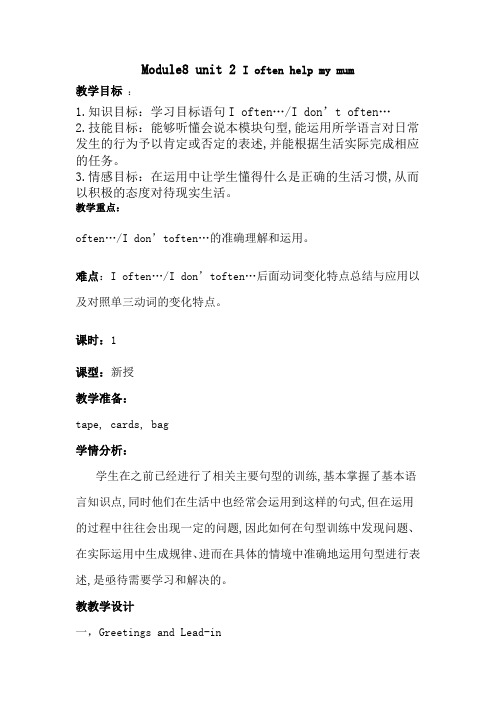
Module8 unit 2 I often help my mum教学目标:1.知识目标:学习目标语句I often…/I don’t often…2.技能目标:能够听懂会说本模块句型,能运用所学语言对日常发生的行为予以肯定或否定的表述,并能根据生活实际完成相应的任务。
3.情感目标:在运用中让学生懂得什么是正确的生活习惯,从而以积极的态度对待现实生活。
教学重点:often…/I don’toften…的准确理解和运用。
难点:I often…/I don’toften…后面动词变化特点总结与应用以及对照单三动词的变化特点。
课时:1课型:新授教学准备:tape, cards, bag学情分析:学生在之前已经进行了相关主要句型的训练,基本掌握了基本语言知识点,同时他们在生活中也经常会运用到这样的句式,但在运用的过程中往往会出现一定的问题,因此如何在句型训练中发现问题、在实际运用中生成规律、进而在具体的情境中准确地运用句型进行表述,是亟待需要学习和解决的。
教教学设计一,Greetings and Lead-inGood afternoon, boys and girls. I am your teacher , Selena. Welcome to my class, English Express, Our call is ?Please follow me: Come , come, come on,we are the winner!!; Yeath ! Of course, today we will go on competing.The topic will be on “ Module 8 Unit 2 I often help my mum.” The goals are:Learn some new expressions.To describe the things you often do.To arrange right rules of daily life.To lead a rich happy healthy life.Now let me introduce the groups : This is Group A, Group B, GroupC, and Group D. Hope you do great jobs! Are you ready?二、Part 1Follow me--- three, two, oneNow let’s get on part 1 “ Look and Guess ---Quick answer” T: do an example ---- play footbal. S: play footbal. Great! One point for you.T: Look at this picture, what is it? One point for you.T: You four read together, You four read one by one. Great. Three points for you.T: Can you read these phrases? Check in groups.Who want to be the teacher?S: This group read, this group say the Chinese meaning//Read one by one. Very good! Two points for you!T: Wonderful ! Here is one present for you.7/ T: At the weekend, I often help my mum. Do you often help your mum? S: Yes, I do. I often help my mum. T: Good girl! Good Boy!Can you answer with “ Do you often ^”三、Part 2T: Now Let’s get on par t 2.Ask and Answer in groups, with “ Do you often …? ” One, two Go!T: Let’s check. You two ask and answer. You two. Your group. Your group.T: good job!But Do you often watch TV at the weekend?a I don’t have a TV, so I don’t often watch TV. Look a t the blackboard. You two ask and answer, please. Good!B Now ask and answer in pairs .T: Let’s check. Who want to be the teacher? Please ask four groups.S: Which group want to try? Your group, please. Ask and answer one by one. Your group, Your group, please. Thank you.T: You say “you don’t often watch TV at the weekend”. Then What do you often do ? I often go shopping and play basketball. What about you? 教师问2个学生。
外研英语六年级上优质教案:Module 8 Unit 2(period1)I often go swimming. 教案(1)
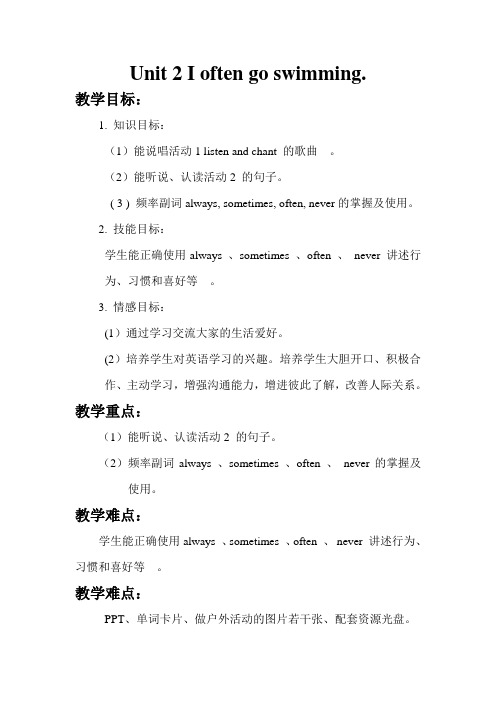
Unit 2 I often go swimming.教学目标:1. 知识目标:(1)能说唱活动1 listen and chant 的歌曲。
(2)能听说、认读活动2 的句子。
( 3 ) 频率副词always, sometimes, often, never的掌握及使用。
2. 技能目标:学生能正确使用always 、sometimes 、often 、never 讲述行为、习惯和喜好等。
3. 情感目标:(1)通过学习交流大家的生活爱好。
(2)培养学生对英语学习的兴趣。
培养学生大胆开口、积极合作、主动学习,增强沟通能力,增进彼此了解,改善人际关系。
教学重点:(1)能听说、认读活动2 的句子。
(2)频率副词always 、sometimes 、often 、never的掌握及使用。
教学难点:学生能正确使用always 、sometimes 、often 、never 讲述行为、习惯和喜好等。
教学难点:PPT、单词卡片、做户外活动的图片若干张、配套资源光盘。
教学过程:Step 1: Warming up and review1. Greetings. (师生间进行简单的问候。
)2.Let’s review.教师带领学生复习上节课活动三内容。
询问对方是否经常做……(某事):Do you often ….? 你经常…… 吗?---- Yes, of course = Yes,(I do)表示肯定,经常做某事。
---- No .I don’t. = Not really.表示否定,不全是,事实上没有。
----Not very often. 不经常做某事。
Step 2: Presentation and Practice一、Look and chant1. 教师播放课文第一部分,“Listen and chant ”,让学生尝试跟唱。
2. 教师简单说一下歌谣大意。
3. 学生完成“Listen and fill in”。
(外研版 三起)六年级英语上册Module8 第二课时Unit 2教案
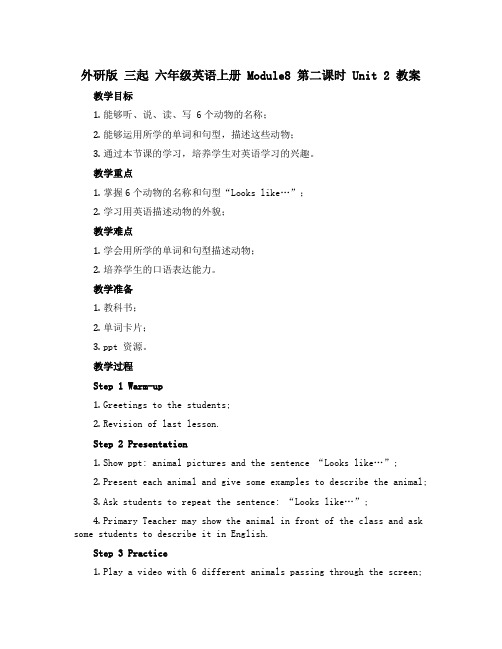
外研版三起六年级英语上册 Module8 第二课时 Unit 2 教案教学目标1.能够听、说、读、写 6个动物的名称;2.能够运用所学的单词和句型,描述这些动物;3.通过本节课的学习,培养学生对英语学习的兴趣。
教学重点1.掌握6个动物的名称和句型“Looks like…”;2.学习用英语描述动物的外貌;教学难点1.学会用所学的单词和句型描述动物;2.培养学生的口语表达能力。
教学准备1.教科书;2.单词卡片;3.ppt 资源。
教学过程Step 1 Warm-up1.Greetings to the students;2.Revision of last lesson.Step 2 Presentation1.Show ppt: animal pictures and the sentence “Looks like…”;2.Present each animal and give some examples to describe the animal;3.Ask students to repeat the sentence: “Looks like…”;4.Primary Teacher may show the animal in front of the class and ask some students to describe it in English.Step 3 Practice1.Play a video with 6 different animals passing through the screen;2.Students may begin to describe the animal they see;3.Primary Teacher can give each student a card with animal picture on it and require them to describe the animal they get.Step 4 Production1.Students form groups of 3 or 4 to discuss what kind of animal they want to draw and describe;2.Students draw the animal they chose and present it to the class with sentences like “Looks like…”.Step 5 Summary and Closure1.Review the new words and sentence: “Looks like…”;2.Ask students to use them in sentences;3.Give the conclusion of this lesson.扩展老师还可以让学生分组自行寻找其他动物的图片和信息,再进行口头描述,提高学生的信息和口语表达能力。
外研版六年级英语上册Module8Unit2Ioftengoswimming第2课时教学案
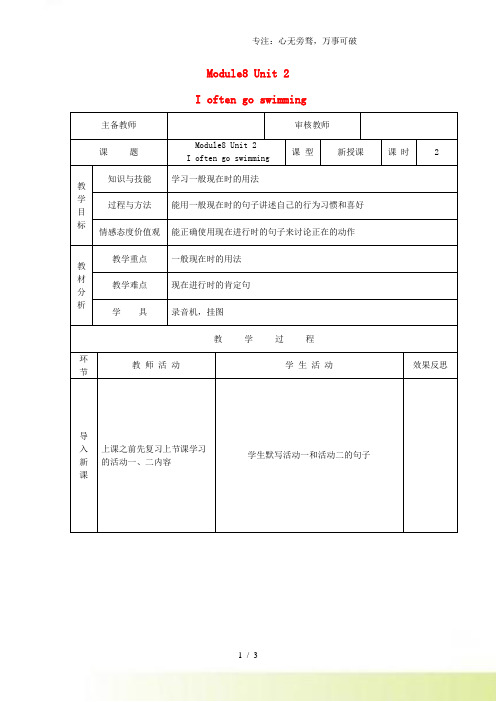
Module8 Unit 2I often go swimming 主备教师审核教师课题Module8 Unit 2I often go swimming课型新授课课时 2教学目标知识与技能学习一般现在时的用法过程与方法能用一般现在时的句子讲述自己的行为习惯和喜好情感态度价值观能正确使用现在进行时的句子来讨论正在的动作教材分析教学重点一般现在时的用法教学难点现在进行时的肯定句学具录音机,挂图教学过程环节教师活动学生活动效果反思导入新课上课之前先复习上节课学习的活动一、二内容学生默写活动一和活动二的句子自主学习学习活动四,英汉互译1、Do you want to see myphotos?2、Do you often clean yourroom?学生英汉互译活动四小组合作活动三、活动五听录音,填写词语展示反馈学生会翻译下列句子1、I’m making a list of things.I like doing.2、Laughing and playing and running and swimming.3、Flying a kite and singing and clapping.4、Having a picnic and climbing a tree.5、Reading a good book and watching Tv.释难解疑Not really的用法1、表示轻微的否定2、表示怀疑或不相信3、表示语气强烈的否定拓展训练同桌之间练习活动六的内容Do you eat bananas?Yes,I sometimes eat bananas.作业设计1)每天听磁带20分钟;2)完成本单元练习册上的习题。
3)根据AB unit 2练习3表格中的内容给自己的一个朋友。
板书设计Never的用法Play的用法。
六年级上册英语教案(含作业设计和反思) Module 8 Unit 2 I often go swi

六年级上册英语教案(含作业设计和反思)Module 8 Unit 2 I often go swimming Period 2 外研版(三起)教学目标1.能够学习和掌握本课重点单词和短语;2.能够学习和巩固本课重点语法;3.能够运用本课所学的语言进行口语和书面表达。
教学重点1.本课重点单词和短语的掌握;2.本课重点语法的学习和巩固。
教学难点能够运用本课所学的语言进行口语和书面表达。
教学过程1. Revision(10分钟)•复习上一课的重点单词和词组。
2. Presentation(30分钟)1.T:Hello, boys and girls. Today we are going to learn Unit 2 of Module 8 in our English textbook. This unit is all about people’s hobbies and what they like to do in their free time.2.T:I’ll introduce some new words first. Please look at the screen and listen carefully. (出示短语并读音) swimming, playing football, playing basketball, playing table tennis, playing computer games, watching TV, reading, skateboarding,playing volleyball3.T:Now, please say the words after me and try to remember them.4.T:The new words are all about hobbies and interests. What’s your hobby? Can you tell me in English? I like ________. (音乐声:I like swimming.)(孩子们跟读)5.T:Now, please look at the sentence on the screen and read itafter me.。
小学英语外研新标准六年级上册Module8六年上册Module8Unit2教案汇报课
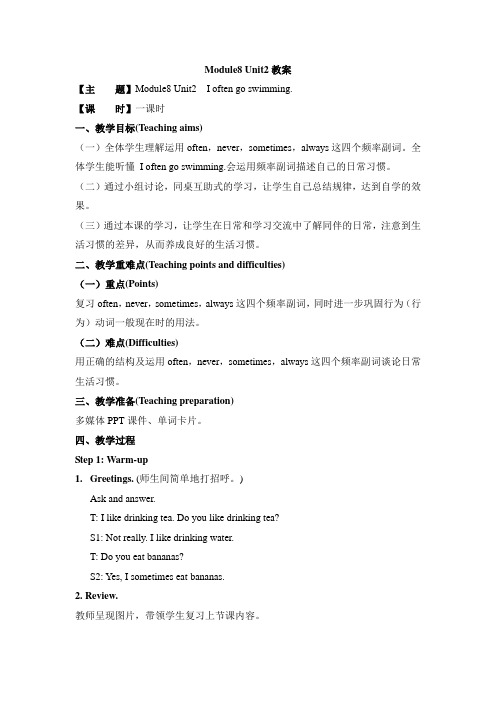
Module8 Unit2教案【主题】Module8 Unit2 I often go swimming.【课时】一课时一、教学目标(Teaching aims)(一)全体学生理解运用often,never,sometimes,always这四个频率副词。
全体学生能听懂I often go swimming.会运用频率副词描述自己的日常习惯。
(二)通过小组讨论,同桌互助式的学习,让学生自己总结规律,达到自学的效果。
(三)通过本课的学习,让学生在日常和学习交流中了解同伴的日常,注意到生活习惯的差异,从而养成良好的生活习惯。
二、教学重难点(Teaching points and difficulties)(一)重点(Points)复习often,never,sometimes,always这四个频率副词,同时进一步巩固行为(行为)动词一般现在时的用法。
(二)难点(Difficulties)用正确的结构及运用often,never,sometimes,always这四个频率副词谈论日常生活习惯。
三、教学准备(Teaching preparation)多媒体PPT课件、单词卡片。
四、教学过程Step 1: Warm-up1.Greetings. (师生间简单地打招呼。
)Ask and answer.T: I like drinking tea. Do you like drinking tea?S1: Not really. I like drinking water.T: Do you eat bananas?S2: Yes, I sometimes eat bananas.2. Review.教师呈现图片,带领学生复习上节课内容。
Ask and answer.How about your weekend? Are you happy?What do you do on the weekends?询问对方是否经常做……(某事):Do you often ….? 你经常……吗?---- Yes, of course = Yes,(I do)表示肯定,经常做某事。
外研版(三起点)六年级英语上册《Module8_Unit2__第2课时教案》
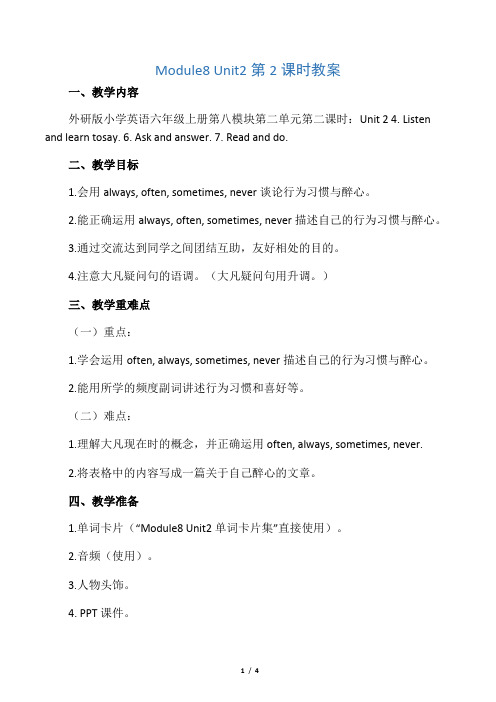
Module8 Unit2第2课时教案一、教学内容外研版小学英语六年级上册第八模块第二单元第二课时:Unit 2 4. Listen and learn tosay. 6. Ask and answer. 7. Read and do.二、教学目标1.会用always, often, sometimes, never谈论行为习惯与醉心。
2.能正确运用always, often, sometimes, never描述自己的行为习惯与醉心。
3.通过交流达到同学之间团结互助,友好相处的目的。
4.注意大凡疑问句的语调。
(大凡疑问句用升调。
)三、教学重难点(一)重点:1.学会运用often, always, sometimes, never描述自己的行为习惯与醉心。
2.能用所学的频度副词讲述行为习惯和喜好等。
(二)难点:1.理解大凡现在时的概念,并正确运用often, always, sometimes, never.2.将表格中的内容写成一篇关于自己醉心的文章。
四、教学准备1.单词卡片(“Module8 Unit2单词卡片集”直接使用)。
2.音频(使用)。
3.人物头饰。
4. PPT课件。
五、教学设计Step 1 Warm-upT: Hello, boys and girls. Are you happy today?Ss: Yes.T: Great. Shall we begin our English class?Ss: OK!Step 2 Presentation1. Ask and answer.T: I like drinking tea. Do you like drinking tea?S1: Not really. I like drinking water.T: Do you eat bananas?S2: Yes, I sometimes eat bananas.T: Now turn to Page 49 and look at Activity 6. There are some habits. You can choose oneyou always/often/sometimes/ never do. And try to ask your friends some questions to findout the one who has the same habit with you.学生在玩“找朋友”的游戏过程中练习句型“Do you always/often/sometimes/never... ?让学生能更确凿地运用该句型进行问答。
外研版英语六年级上册module 8《unit 2 i often go swimming》优秀教案(重点资料).doc
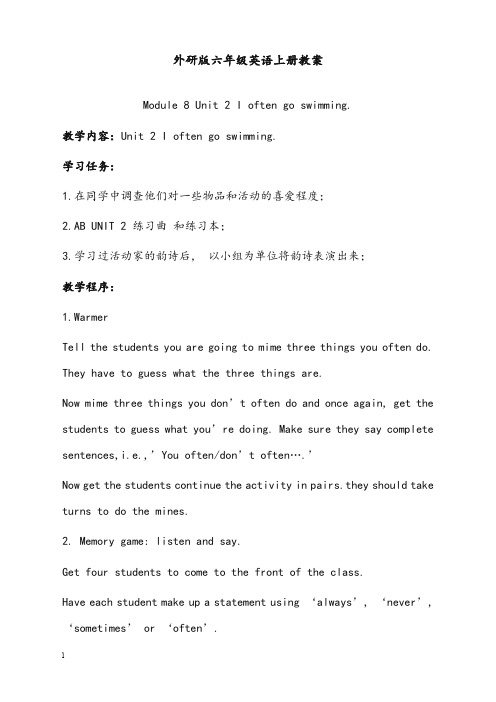
外研版六年级英语上册教案Module 8 Unit 2 I often go swimming.教学内容:Unit 2 I often go swimming.学习任务:1.在同学中调查他们对一些物品和活动的喜爱程度;2.AB UNIT 2 练习曲和练习本;3.学习过活动家的韵诗后,以小组为单位将韵诗表演出来;教学程序:1.WarmerTell the students you are going to mime three things you often do. They have to guess what the three things are.Now mime three things you don’t often do and once again, get the students to guess what you’re doing. Make sure they say complete sentences,i.e.,’You often/don’t often….’Now get the students continue the activity in pairs.they should take turns to do the mines.2. Memory game: listen and say.Get four students to come to the front of the class.Have each student make up a statement using ‘always’, ‘never’, ‘sometimes’ or ‘often’.Make sentences with ‘he, she , his, her’.Examples: T (points to or indicates daming)Ss: he always cleans his room.TLpoints to or indicates lingling)Ss: she never plays with dolls.3.Listen and say, then chant.Get the students to look at the pictures and describe them(a child laughing, singing, clapping, reading a book). Ask the students if they like doing these activities.Play the tape and let the students listen to the chant, play it again and have the students say the chant at the same time.Go through the chant and cemonstrate the mime for each of the actions mentioned in the chant. The students should do the appropriate mime as they read the activities in the chant.4. after saying the chantHave the students substitute other actions instead of the ones mentioned in the chant. Explain that as ‘tree’ and ‘tv’ rhyme. They should not change those two activities.Point out that they shoud choose activities with the same number of syllables as the originals.5.homework: read the chant6. blackboard design:Unit 2 I often go swimming.Always never sometimes or oftenhe always cleans his room.she never plays with dolls.教学札记:*************************************★祝学习顺利★。
- 1、下载文档前请自行甄别文档内容的完整性,平台不提供额外的编辑、内容补充、找答案等附加服务。
- 2、"仅部分预览"的文档,不可在线预览部分如存在完整性等问题,可反馈申请退款(可完整预览的文档不适用该条件!)。
- 3、如文档侵犯您的权益,请联系客服反馈,我们会尽快为您处理(人工客服工作时间:9:00-18:30)。
Module 8 Unit 2I often read English books.教案
教学目标:1)学生能四会单词:wash, help, finish, clean;
2)学生能正确认读功能句
a. I clean my room.
b. I wash my trousers.
c. I help my mum.
教学重点: 1. 初步感知一般现在时的正确用法; 2. 学习生词wash, help, finish, clean;
教学难点:使学生理解一般现在时的正确使用范围,学生能有意识的正确使用现在式。
教学过程:
一、Warm up
1. Sing a song.
T: Are you happy today? If you are happy, let’s sing the song “If you are happy”。
2. Guessing game.
T: Well done. Sit down please. This time let’s do and guess.
教师示范:教师看一眼图片,然后做动作让学生猜,再请学生上来。
二、Presentation
1. Yesterday.
(1)PPT
T: Look, this is a calendar, today is …?How about this one? It’s …
(2)T: 拿着卡片让学生开火车读。
2. 初步感知一般现在时。
T: today I am very happy, because today is my birthday.
PPT: 根据学生的回答来显示图片。
T: Excellent. Now let’s read them together.
3. 简单用。
T: I am very happy. What do you do?
教师将学生提到的动词分类贴/写在黑板上。
三、Text 1. Whole input listen.
T: That’s what we do. How about our friend Daming, what do he do? Let’s look
and listen.
如果学生答得不好则再听一遍。
2. new words.按学生选择的顺序教。
(1)clean
T: 大小声:I often clean my room.
(2)read
I often read English book.
四、Practice.
(1)T: (拿着卡片)Let’s read them. 1,2.
(2)T: Now, let’s put them in the right place.(师读句子,故意放错,看生的反应)。
(3)Read the sentences together.
五、Reinforcement.
(1)Passing game.
T: Look, we learned so many things. (老师指黑板)we are a little bit tired.
Let’s played a game, OK?
T: The first s read the sentence and remember it. Then I will say 1, 2, 3 go. You pass the sentence as fast as you can. Your team win.(师边说边做动作)。
T: Say the sentences to the Ss. Are you ready? 1, 2, 3 go.
T: Clap your hands for them. (有节奏的拍手)
(2)Make sentences.
T: Now I want 3 Ss, who can come here and help me? Each s choose one, and make a sentence to your group member.
T: Who wants to try?
六、practise
七、Home work 1. Read the text. 2. Write the words and the sentences.。
